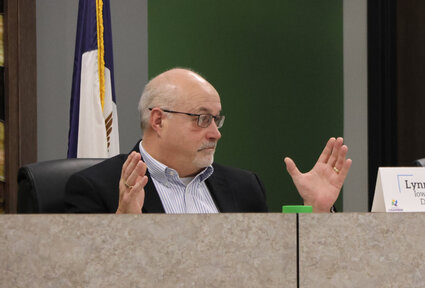AEAs main focus at Eggs & Issues
4 area lawmakers sound off on proposed changes
February 1, 2024
BY NICK PEDLEY
Just like last year, education reform proved to be the main dish during the first Eggs & Issues legislative forum held last Saturday in Spencer.
Reps. Megan Jones and John Wills, along with Sens. Lynn Evans and Dave Rowley, answered a smorgasbord of questions regarding the governor's plan to reform the state's nine Area Education Agencies (AEAs). The proposal has been the headlining piece of legislation thus far in the 2024 session.
Evans, a Republican from Aurelia, served more than three decades in public education before making the leap to politics. He's leading the bill in the Senate and estimated more than 1,700 emails have flooded his inbox about the governor's proposal thus far.
"The voice of the input is being heard, which is a good thing," he said. "Oftentimes bills get dropped, people weigh in and it doesn't really change the course of things. When it changes the course of a bill literally two days after it's been put into the system, then someone is willing to listen."
The nine agencies were created 50 years ago to serve Iowans with disabilities from birth to age 21. Since then, AEAs have broadened their offerings to include a variety of other services.
The agencies evaluate students to determine whether they need special assistance, advise and support special education teachers, and also provide direct services to students such as speech, physical and occupational therapy. Reynolds proposed sweeping changes to the way they operate in her Condition of the State address in January, which included allowing school districts to seek the services elsewhere and confining the agencies' services to special education.
As per the Iowa Capital Dispatch, the legislation was officially introduced on Jan. 16 and by Jan. 18, it was amended to allow the agencies to continue to offer services beyond special education. According to the governor, Iowa students with disabilities aren't scoring well when compared to those in other states – her office says more than half of the country's states are helping those students more effectively than Iowa, necessitating reform here.
Jones said it was the state's responsibility to address achievement shortfalls before the U.S. Department of Education intervenes.
"The ultimate issue is that the feds are watching us and are nervous about us, and I think we're nervous about ourselves too," she said.
One attendee asked about the validity of the testing data used to steer reform. According to discussion, the low achievement scores stem from the National Assessment of Education Progress (NAEP), with only 266 of roughly 75,000 Iowa students with disabilities taking it.
Evans called the NAEP a "dipstick measure" of student achievement, and the data collected is used to translate progress on a larger scale.
"A gap exists. I don't think any educator in this room believes there isn't a gap that we need to be trying to close," he said. "We can do better and we have to do better."
Some of those in attendance were concerned about the speed at which the bill was moving. Jones said the Legislature is doing its due diligence by receiving public comment; however, time is of the essence.
She explained it takes a minimum of 180 days for rules to be written and implemented, meaning the bill would have to pass in mid-March for it to be on the books by July 1 when the state's new fiscal year begins.
"I kind of understand why there's this desire to move faster, but maybe the folks from the federal government have ideas that we should listen to," she said. "I don't think it hurts any of us to listen."
Evans noted Iowa should continue looking at ways to improve its AEAs so the state's most needy students can see better educational outcomes. He didn't blame the agencies for achievement shortfalls, instead noting they are part of the system and every system needs reform over an extended period of time.
"There's nothing wrong with revamping a system that's been in place for 50 years," he said.
Neither Rowley nor Wills offered much input on the governor's AEA proposal. Wills said the Legislature should look at all ways to improve AEAs to revert them back to their core mission.
"We're in the business of educating kids, we're not in the business of protecting institutions," he said.
Rowley encouraged constituent input on the issue and said lawmakers are continuing to do their due diligence.
"We're talking to administrators, we're talking to the AEAs, teachers and superintendents," he said. "When governments look at something like this, naturally there's pushback."
The governor's AEA proposal remained a big point of discussion this week at the Capitol. The House and Senate were slated to hold subcommittees on the bill on Wednesday afternoon.
Other topics of discussion at last Saturday's forum included election laws and voter fraud, changes to state licensure laws, and depositions in child sex abuse cases.
The next Eggs & Issues event will be held on Saturday, Feb. 24 from 9-10:30 a.m. They are held inside Spencer Council Chambers, and are open to the public. The final forum is slated for Saturday, March 23.







